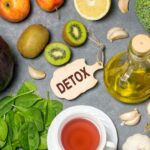Detoxification is a natural process your body performs daily to eliminate toxins and waste products. This process involves several organs, including the liver, kidneys, skin, and lungs. Vitamins play a crucial role in supporting these detoxification pathways. In this guide, we will explore the vital role of vitamins in detoxifying the body, highlight the best sources of these essential nutrients, and answer common questions about vitamins and detoxification.
Understanding Detoxification
The Body’s Detoxification System
The human body has a sophisticated detoxification system designed to process and eliminate toxins. This system includes:
- Liver: The primary detoxifying organ, the liver processes toxins and prepares them for elimination.
- Kidneys: Filter blood to remove waste and excess substances, excreting them as urine.
- Skin: Eliminates toxins through sweat.
- Lungs: Expel carbon dioxide and other gaseous wastes.
- Digestive System: Removes waste products through feces.
How Toxins Affect the Body
Toxins can come from various sources, including environmental pollutants, processed foods, alcohol, and medications. When the body accumulates too many toxins, it can lead to various health issues, such as fatigue, headaches, digestive problems, and weakened immunity.
Key Vitamins for Detoxification
Vitamin C
Role in Detoxification
Vitamin C is a powerful antioxidant that helps neutralize free radicals and supports the immune system. It enhances the liver’s ability to detoxify by promoting the production of glutathione, a critical antioxidant in detox processes.
Sources of Vitamin C
- Citrus fruits (oranges, lemons, grapefruits)
- Berries (strawberries, blueberries, raspberries)
- Kiwi
- Bell peppers
- Broccoli
Vitamin E
Role in Detoxification
Vitamin E works synergistically with vitamin C to protect cells from oxidative damage. It also supports liver function and helps in the regeneration of glutathione.
Sources of Vitamin E
- Nuts and seeds (almonds, sunflower seeds)
- Green leafy vegetables (spinach, Swiss chard)
- Vegetable oils (sunflower, safflower)
- Avocado
Vitamin A
Role in Detoxification
Vitamin A supports the integrity of the skin and mucous membranes, which are the first line of defense against toxins. It also aids in liver function and enhances the immune response.
Sources of Vitamin A
- Carrots
- Sweet potatoes
- Dark leafy greens (kale, spinach)
- Liver
- Fish oils
B Vitamins
Role in Detoxification
B vitamins, particularly B6, B9 (folate), and B12, are essential for liver detoxification processes. They help convert toxins into water-soluble forms that can be excreted through urine.
Sources of B Vitamins
- Whole grains (brown rice, oats)
- Legumes (beans, lentils)
- Nuts and seeds
- Meat, poultry, and fish
- Dairy products
Vitamin D
Role in Detoxification
Vitamin D supports the immune system and has anti-inflammatory properties that aid in detoxification. It also helps regulate the body’s detoxification pathways.
Sources of Vitamin D
- Sunlight exposure
- Fatty fish (salmon, mackerel)
- Fortified dairy products
- Eggs
Vitamin K
Role in Detoxification
Vitamin K plays a role in liver function and helps protect against liver damage. It also supports the blood clotting process, which is essential for healing and detoxification.
Sources of Vitamin K
- Leafy green vegetables (kale, spinach, broccoli)
- Fermented foods (natto, sauerkraut)
- Meat and dairy products
How to Incorporate Detoxifying Vitamins into Your Diet
Balanced Diet
Eating a balanced diet rich in fruits, vegetables, whole grains, and lean proteins ensures you get a wide range of vitamins necessary for detoxification. Aim to include a variety of colors on your plate to maximize nutrient intake.
Supplementation
While it’s best to get vitamins from food, supplements can help fill in the gaps. Consult with a healthcare professional before starting any supplement regimen to ensure it’s appropriate for your needs.
Hydration
Staying hydrated is crucial for detoxification. Water helps transport nutrients to cells and aids in the elimination of toxins through urine and sweat.
Avoiding Toxins
Limit your exposure to toxins by choosing organic foods, avoiding processed foods, reducing alcohol intake, and avoiding smoking. These steps reduce the burden on your detoxification system.
FAQs about Vitamins and Detoxification
How does vitamin C help with detoxification?
Vitamin C boosts the immune system, neutralizes free radicals, and supports liver function by enhancing glutathione production, which is vital for detoxification.
Can vitamin E help detoxify my body?
Yes, vitamin E is an antioxidant that protects cells from oxidative damage and works with vitamin C to support liver function and detoxification processes.
What foods are high in detoxifying vitamins?
Foods rich in detoxifying vitamins include citrus fruits, berries, green leafy vegetables, nuts, seeds, whole grains, and lean proteins like fish and poultry.
Is it necessary to take vitamin supplements for detoxification?
It’s best to get vitamins from food, but supplements can help if you have deficiencies or higher needs. Consult with a healthcare professional before taking supplements.
How does vitamin A support detoxification?
Vitamin A maintains the integrity of the skin and mucous membranes, aids liver function, and enhances immune response, all of which are crucial for detoxification.
What role do B vitamins play in detoxifying the body?
B vitamins help liver enzymes convert toxins into water-soluble forms for excretion. They are essential for various detoxification pathways in the liver.
Can vitamin D aid in detoxification?
Yes, vitamin D supports the immune system and has anti-inflammatory properties that help regulate the body’s detoxification pathways.
How much water should I drink to support detoxification?
Aim for at least eight 8-ounce glasses of water daily, but individual needs may vary based on factors like activity level, climate, and overall health.
Are there specific foods I should avoid to help my body detoxify?
Avoid processed foods, sugary snacks, excessive alcohol, and foods high in unhealthy fats. Opt for whole, organic foods to reduce your toxin intake.
How do I know if I need more detoxifying vitamins?
Signs of vitamin deficiencies include fatigue, weakened immunity, poor skin health, and digestive issues. Consult with a healthcare provider for personalized advice and potential testing.
Conclusion
Vitamins play a critical role in the body’s natural detoxification processes. By ensuring you get enough vitamins from a balanced diet and possibly supplements, you can support your liver, kidneys, and other detoxifying organs to function optimally. Remember to stay hydrated, eat a variety of nutrient-rich foods, and limit toxin exposure to maintain a healthy detoxification system. If you have specific health concerns or dietary needs, consulting with a healthcare professional can provide tailored guidance to help you achieve your detoxification goals.


